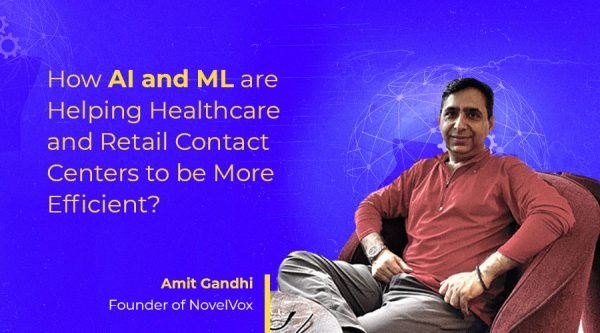The use of AI and ML in the healthcare and retail sectors have grown exponentially
Artificial intelligence can broadly be described as a branch of technology that thrives on the concept of software carrying out tasks in pre-emptive ways. AI can be leveraged to develop computers that replicate human intelligence to recognize speech, make decisions, adapt to circumstances, plan, make predictions and solve problems. A subset of it is Machine Learning, which banks on data and pattern identification to minimize human intervention. AI & ML is rapidly being adopted across different industries like media, telecom, banking, healthcare, retail, etc. Among the latter two, AI & ML is mostly being adopted via contact centre solutions.
Though the application of Artificial Intelligence in contact centres is still new and evolving, there are a few significant examples of AI-integrated contact centre solutions reducing operational cost and personalizing the customer experience, while simultaneously increasing agent efficiency with actionable analysis.
Healthcare
Adoption of AI-powered contact centre solutions by a hospital or healthcare centre results positively for patients, doctors, nursing staff, clerical or front office staff, and eventually the whole ecosystem. While the patients do not need to wait in queues for long hours, staffers do not have to cope with the influx of an unmanageable number of patients for different purposes like admission, appointments, insurance clearance, or even clinical assessment.
Through unified agent desktops, healthcare providers can put their patients first. As the Agent Desktops are integrated with EMR/EHR, including EPIC, Cerner, Aetna, etc, contact centre agents get instant access to all information of a patient like an appointment status, the reason for the call, and doctor’s availability. They can transfer a call with complete information easily within multiple departments, take actions like managing appointments, raising service requests, and more right from their desktop.
By using AI-integrated contact centre solutions, the patients can complete all paperwork and formalities from the comfort of their homes. Besides, patients’ appointments can be booked with ease in a convenient time slot for consultation with a preferred doctor. This would eventually help hospitals in streamlining any increased inflow of patients. AI-enabled solutions also help doctors and patients connect easily via video calls to take stock of symptoms and prescribe medicines accordingly. Much headway has already been made from teleconsultations to video consultations. The services are on a 24×7 basis, with bots powered by AI & ML to play a significant role. While they manage all queries, they also connect patients with the required department on a need per basis.
Retail
Conversational AI is an integral tool driving the trend in contact centre solutions for the retail industry. When we talk about conversational AI, we essentially refer to a set of technologies powering automated messaging and speech-enabled applications. It recognizes the text and speech while underlying the context to respond, which is how humans usually converse. Different technologies used as part of it are Advanced Dialogue Management, Automatic Speech Recognition, and Natural Language Processing. The next in line is voice bots.
Virtual dressing rooms are also among the factors through which AI and ML are helping retail contact centers to be more efficient and provide a wholesome shopping experience. The live experience of products can be enabled, thereby cutting down on the hassles of going to market for buying any product. The selected item is overlayed on the customer’s live video feed, giving a near-exact idea of fit, size, and style. This helps make a smart buying decision and also the outlets or brands by bridging the gap with the customers.
Through prescient learning capacities, AI can uncover non-clear patterns in a contact community’s information logs. These patterns are studied at both enormous scope levels and on a singular guest premise. ML tools will then, at that point, guess how best to react when it sees those patterns unfurling. Everything from picking the best advancements to run, to the sort of association a client leans towards is not set in stone through intellectual ML. Traditional CRMs focus on managing customer needs. A completely incorporated, AI-upheld contact focus goes past overseeing connections into intellectually expecting their necessities… before the specialist even gets the phone.
Source: analyticsinsight.net









